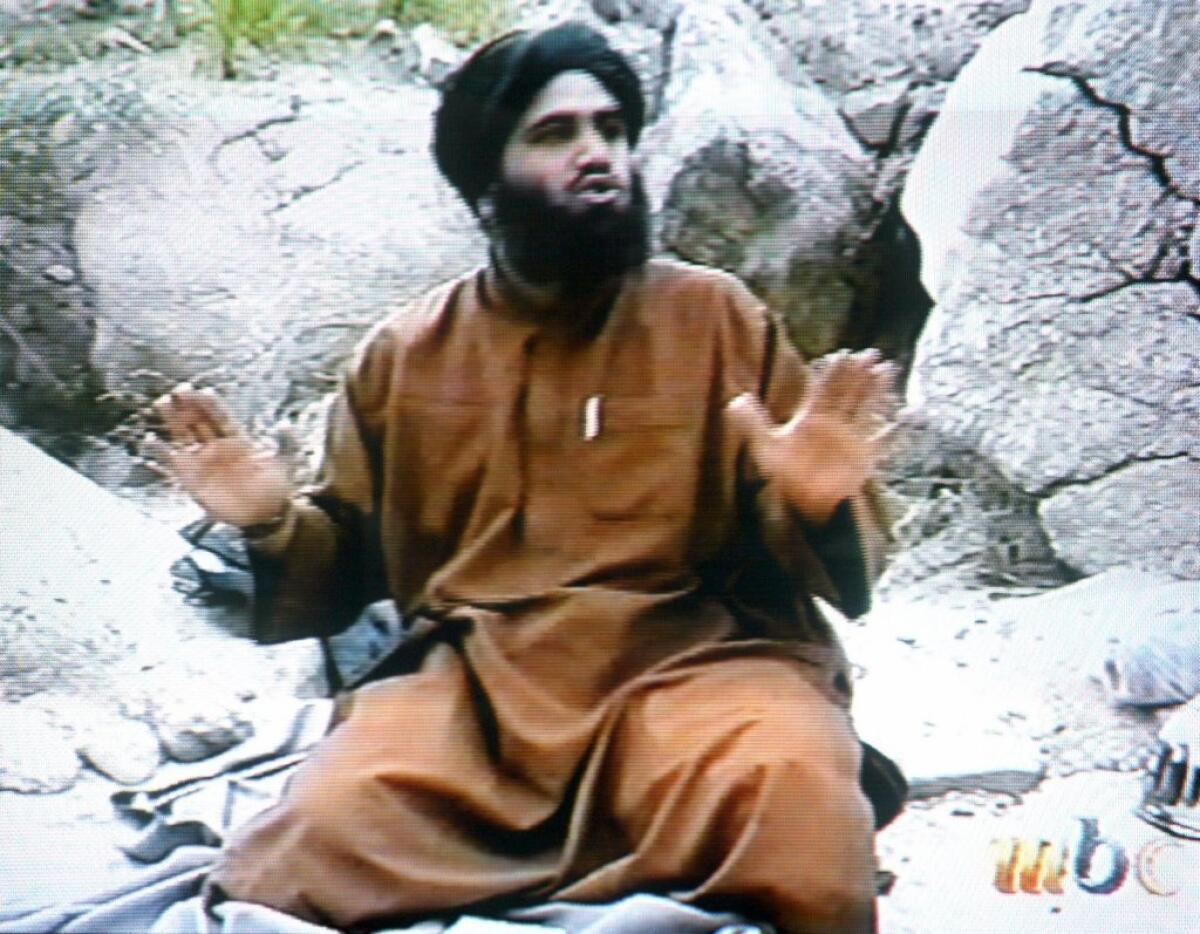Presumed 9/11 mastermind rejects claims about Bin Laden’s son-in-law

- Share via
NEW YORK -- The self-proclaimed architect of the Sept. 11, 2001, attacks says a former Al Qaeda spokesman on trial in New York may have been “an eloquent, spell-binding speaker” who urged attacks on America, but he was not the high-level terrorist that prosecutors allege.
In fact, Khalid Shaikh Mohammed, who was one of Al Qaeda’s top organizers of terrorist operations, portrays Sulaiman abu Ghaith as a little-known figure who would never have been privy to details of upcoming attacks on Western targets.
Jurors may get to hear Mohammed’s written testimony this week as Abu Ghaith’s trial on charges of conspiring to kill Americans enters its third week Monday in federal court in lower Manhattan.
The statement from Mohammed, who is being held at the U.S. military prison in Guantanamo Bay, Cuba, was contained in a motion filed Sunday by defense attorney Stanley Cohen, who says Mohammed’s words are critical to his client’s case and should be presented to jurors as the defense begins presenting witnesses. Prosecutors rested their case Friday.
Abu Ghaith faces life in prison if convicted of conspiring to kill Americans, conspiring to provide material support or resources to Al Qaeda, and providing material support and resources to Al Qaeda.
Prosecutors have alleged that Abu Ghaith’s words in his post-Sept. 11 speeches show that he knew in advance of specific plots, including one in December 2001 to destroy U.S. jetliners with bombs hidden in suicide bombers’ shoes.
Because Mohammed is being held at Guantanamo, he was not allowed to travel to New York to testify for the defense. Cohen submitted questions in writing to Mohammed on Feb. 19; military officials on March 13 provided the defense with Mohammed’s 14-page response, which Cohen in court papers described as “unedited, un-redacted, and unclassified.”
Mohammed prefaced his written replies by noting that they were in response to 451 questions covering 34 pages. “It reminded me of the interrogations at the Black Sites and the questions from the dirty team at Guantanamo,” he said.
“Black sites” refers to the secret prisons operated by the CIA outside the United States and used to detain accused terrorists deemed enemy combatants.
Mohammed also wrote that he would not agree to give audio or video testimony, even if asked by the defense.
“These answers should suffice,” he said.
Mohammed described himself as the head of Al Qaeda’s foreign operations, a job given to him by Osama bin Laden that involved organizing “all the jihadist operations” conducted outside of Afghanistan, including the September 2001 attacks.
He said he did not know Abu Ghaith personally and only came to know of him by listening to recordings of sermons that Abu Ghaith had delivered when he was an imam at a mosque in Kuwait.
“I do not recall that I ever met him or saw him at a training camp” in Afghanistan, Mohammed said.
As for whether Abu Ghaith knew in advance of plots to attack U.S. targets after Sept. 11, as prosecutors allege, Mohammed said nobody except Al Qaeda’s top security and military officials know such details.
“The operations ... and the plans for them are known only to the leader of the operation and the military and security officials involved,” he said. “Those carrying out the operations are not privy to the specific plans until the goal or the time of the operation approaches for fear that the operation will be botched or miscarried.”
He rejected prosecutors’ allegations that Abu Ghaith’s post-Sept. 11 speeches, in which he warned of future attacks on the United States, showed he was part of a conspiracy.
“Perhaps there is another reason” that someone might be given the job of making such speeches for Al Qaeda, Mohammed said. “And that is the rhetorical ability of the person or the strength and discipline of his speech or his literary fortitude – especially if he is an eloquent and spell-binding speaker. Perhaps that is one of the reasons why (Abu Ghaith) was commissioned for this mission.”
Mohammed also played down the importance of pledging “bayat,” or allegiance, to Bin Laden. One witness for the prosecution has testified that he heard Abu Ghaith discussing the concept of the pledge at an Al Qaeda guesthouse in 2001.
“Swearing bayat does not mean a person is placed on a list to carry out an operation,” Mohammed said. “Even the cook has sworn bayat.”
Abu Ghaith, who is married to one of Bin Laden’s daughters, has been in U.S. custody since March 2013, when he was arrested while traveling from Turkey to Kuwait. He has pleaded not guilty to terrorism charges.
Mohammed has twice testified as a star defense witness for members of Al Qaeda since his capture in 2003.
In 2006, his interrogation summaries were read aloud in the capital murder trial of Zacarias Moussaoui, the so-called 20th hijacker in the Sept. 11 attacks, and Moussaoui was spared the death penalty.
Two years later, different statements by Mohammed were read in a military commission trial, or tribunal, that led to the release from Guantanamo Bay of Bin Laden’s chauffeur, Salim Hamdan.
More to Read
Sign up for Essential California
The most important California stories and recommendations in your inbox every morning.
You may occasionally receive promotional content from the Los Angeles Times.











